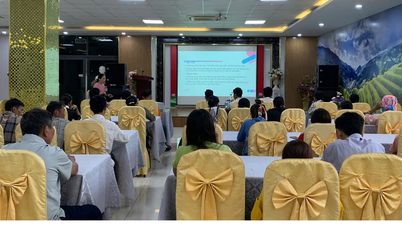Consumption of sugary drinks in Vietnam is increasing rapidly. From 2009 to 2023, consumption increased fourfold, from 2013 to 2023 alone, from 3.44 billion liters to 6.67 billion liters. On a per capita basis, consumption has increased by 350%.
In 2023, each Vietnamese person consumed an average of 66 liters of sugary drinks, equivalent to 18g of sugar per day from these drinks. This amount of sugar accounts for 36% of the maximum recommended level by the World Health Organization for adults (less than 50g of sugar/person/day), indicating potential health risks due to excessive sugar consumption.
Sugary drink consumption is also alarming. According to the 2019 Global Survey on Vietnamese Student Health, which surveyed 7,796 students aged 13 to 17 in 20 provinces and cities, 33.96% of students drank carbonated soft drinks at least once a day.
Forecasts from several international organizations show that, without effective control measures, sugary beverage consumption in Vietnam will continue to increase by an average of 6.4% per year from 2023 to 2028, increasing the risk of non-communicable diseases such as overweight, obesity and diabetes.
Faced with this situation, implementing measures to control the consumption of sugary drinks is urgent, especially for children and adolescents.
Experts have pointed out that one of the proposed effective solutions is to apply special consumption tax on sugary drinks, to curb the trend of overconsumption and reduce the amount of sugar absorbed in the population.
Consumption of sugary drinks has been linked to cardiovascular disease, diabetes, overweight, obesity and cancer. According to a cross-sectional survey of 2,678 students in 31 secondary schools in Ho Chi Minh City, children who regularly drink soft drinks are three times more likely to be overweight or obese than children who do not drink them regularly.
Along with the doubling of sugary drink consumption in Vietnam, in the past 10 years, the rate of overweight and obesity in school children aged 5 to 19 has also doubled, from 8.5% in 2010 to 19% in 2020, and in adults, the rate of overweight and obesity has increased by 30% in 6 years, from 15.6% in 2015 to 19.6% in 2020, showing a direct link between the use of sugary drinks and obesity and causing cardiovascular diseases and diabetes.
A comprehensive study on overweight and obesity and risk factors of overweight and obesity in Vietnam shows that soft drink consumption is a risk factor for overweight and obesity and requires intervention to reduce consumption.

A study in 75 countries around the world also showed that for every 1% increase in sugary drink consumption, there were 4.8% more overweight adults, 2.3% more obese adults and 0.3% more people with diabetes. Sugary drink consumption increased the risk of obesity by 18%, increased the risk of high blood pressure by 12%, increased the risk of type 2 diabetes by 29% and increased the risk of metabolic syndrome by 29%.
The World Health Organization has concluded that regular consumption of sugary drinks increases the risk of type 2 diabetes, cardiovascular disease, tooth decay, osteoporosis, and overweight and obesity, and potentially leads to an increased risk of other non-communicable diseases, including cancer.
Consumption of sugary drinks is a direct cause of obesity and thereby causes cardiovascular diseases and diabetes. Therefore, applying solutions to limit the use of sugary drinks is a feasible and scientific solution to control and prevent diseases such as cardiovascular diseases, cancer, diabetes, overweight and obesity.
To limit the consumption and use of sugary drinks, the World Health Organization emphasizes that countries need to apply synchronous measures: for this product; widespread communication about the harmful effects of regular consumption of sugary drinks; limit advertising; develop school meal policies... in which tax is a highly effective and low-cost measure.
Based on scientific evidence, the World Health Organization has recommended that to reduce sugar consumption from sugary drinks sufficiently to prevent obesity and related health problems, taxes on sugary drinks should ensure an increase in retail prices of at least 20%.
Research by the University of Public Health has shown that if a tax is imposed to increase the retail price of sugary drinks by 20% as recommended by the World Health Organization, the rates of overweight and obesity can be reduced by 2.1% and 1.5% respectively, preventing 80,000 cases of diabetes, saving the health system nearly 800 billion VND.
Currently, at least 108 countries in the world have imposed excise taxes on sugary drinks, including 7 countries in Southeast Asia. This proves that imposing taxes on sugary drinks is a feasible measure for developed and developing countries, including Vietnam.
In the Report on explanation, acceptance and revision of the draft Law on Special Consumption Tax amended at the discussion session of the recent National Assembly session, Chairman of the National Assembly's Economic and Financial Committee Phan Van Mai said that adding sugary soft drinks to the list of subjects of special consumption tax is to institutionalize the Party and State's policy on protecting people's health, recommendations of the World Health Organization, the United Nations Children's Fund and the Ministry of Health.
The proposal to impose a tax on sugary soft drinks is the first step in the process of implementing solutions to limit the production and consumption of products containing a lot of sugar in food and drinks. The tax will not only help reduce the use of these products, but also encourage beverage companies to create healthier products for consumers' health and people will tend to use healthier drinks such as filtered water, pure fruit juice, and low-sugar drinks.
This will contribute to preventing non-communicable diseases while increasing revenue through excise tax, thereby realizing the General Secretary's direction on moving towards free hospital fees by 2030–2035.
Source: https://baolaocai.vn/he-luy-den-suc-khoe-tu-do-uong-co-duong-ngay-cang-ro-post402758.html




























































































Comment (0)